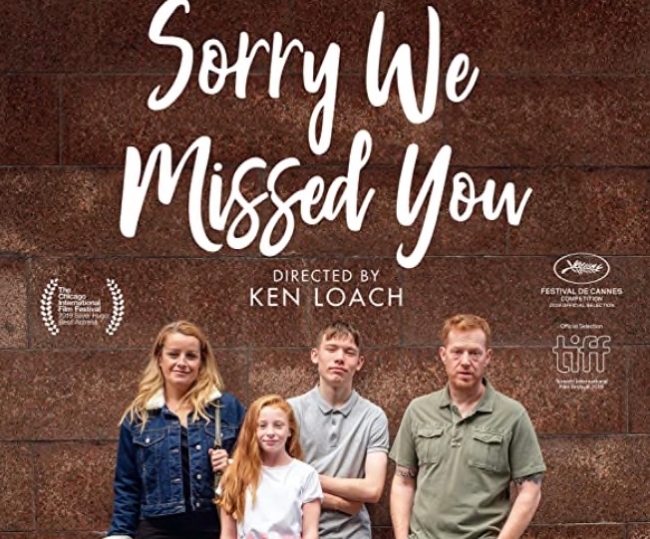 June
14
June
14
Tags
Sorry We Missed You (2019)

The 2008 Global Financial Crisis wreaked havoc everywhere, and now Covid-19 will reshape economies for years to come. It is in this broader context that the British film Sorry We Missed You (2019) offers a gritty and prescient warning about an industrial revolution that is silently creating new classes of winners and losers. It’s called the Gig Economy.
Set in post-GFC Newcastle, we meet the close working-class family of Ricky (Kris Hitchen), his wife Abbey (Debbie Honeywood), and teenagers Seb (Rhys Stone) and Liza (Katie Proctor). Ricky is a labourer who is proud of never having taken the dole and dreams of one day running his own business. An offer too good to refuse suddenly appears: buy a courier van and become your own boss. To raise money, he sells the family’s only asset, a car Liza uses for making piece-rate visits to care for elderly people in their homes.
Ricky soon finds himself in a prison-like virtual workplace where his every move is app-tracked and every delivery delay heavily penalised. Abbey’s working day lengthens as she struggles to make home visits by bus; iPhone parenting leaves the kids abandoned, and their behavioural problems worsen dramatically. Ricky is buckling under a frantic workload, made worse by a supervisor who couldn’t care less if people are driven to despair. Every late delivery incurs losses, and mounting fines and financial debt becomes a one-way street.
Realistically filmed without cinematic or acting embellishments, the roles of Ricky and Abbey are not cast to be particularly likeable or with any depth of character. Rather, they are avatars for countless anonymous victims of economic change: hard-working, good people who want to live a decent life. Through no fault of their own, people like them are fuelling the ‘new normal economy’ that is tightening its chokehold, squeezing humanity out of society.
As he did in I, Daniel Blake (2016), director Ken Loach speaks with a lucid and sombre voice in portraying the ugly side of modern capitalism. The escalating psychological pressure that is incrementally layered across this miserable narrative is palpable. It is not a joyful viewing experience, but it does offer an insightful glimpse into a future that should sound alarm everywhere.

Director: Ken Loach
Stars: Kris Hitchen, Debbie Honeywood, Rhys Stone, Katie Proctor

Ken Loach has always championed the every-day people and I also found this one really heartbreaking, what’s worse is that it’s really normal people’s lives here, the systems used are based on real reports.
Loach also uses people who haven’t acted before, it was Debbie Honeywood’s debut, which makes it even more impressive!
If you fancy it, here’s my review as well 🙂 https://criticalpopcorn.com/2020/03/09/sorry-we-missed-you-dvd-review-dir-ken-loach-2019/
LikeLiked by 2 people
Good point about the novice actors; they add a human layer of realism to the film.
LikeLiked by 1 person
If I recall correctly, (it’s been at least six months since viewing), the closing frames show Ricky desperate to continue his working day when he should be in hospital.
The frantic imperative to ‘earn a quid’ is where our economic ideals of ‘trickle down’ end up. Ken Loach has a keen eye.
I consider his films the ‘kitchen sink’ dramas of our present. For a while after WWII, economic opportunities were available to working class kids in Australia at least, via an expansive scholarship system and a huge government employer in the public service. All the members of the family in which I grew up were strongly encouraged to take up this source of employment. Nowadays, young people are encouraged to be self-employed. Hmmm.
LikeLiked by 2 people
Self-employed is a too-often used euphemism for under-employment; Covid-19 will exacerbate that trend. As Loach points out, capitalism is being stress-tested and is failing.
LikeLiked by 2 people
Indeed Richard. I felt for the family who were so well intentioned as those we see in real life. It was not through want of trying that things went awry. The odds were stacked against them.
LikeLiked by 1 person
Anita – Yes, I think he just keeps going, even after being badly attacked…
It does feel like an each-to-their-own society pushed by government at this current time, sold and hidden as something for ‘everyone’, offering people a freedom that’s merely a pipe dream. It’s difficult not to get pulled down into the mire of the rich ‘who keep getting richer’ but it also holds a huge baring on the UK. Not helped by the ridiculous Brexit of late, what a disaster… 😦
LikeLiked by 2 people
Hi Dan. Hard to believe that working people voted for Brexit. There must have been some powerful persuading to get people to vote against their own best interests.
Now COVID 19 is added to the mix! 2020 is not going to be a good year for anyone.
LikeLiked by 2 people
That’s one of the big things I never understand, or how people are led to the conclusion that it would help them. Usually it’s the ones who need the EU the most, who voted to leave. The county of Cornwall voted to leave and then asked if they’d still be getting their EU grants….
Mad year, this is history I guess, let’s hope it settles down eventually.
LikeLiked by 2 people